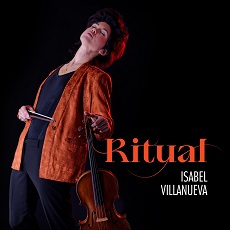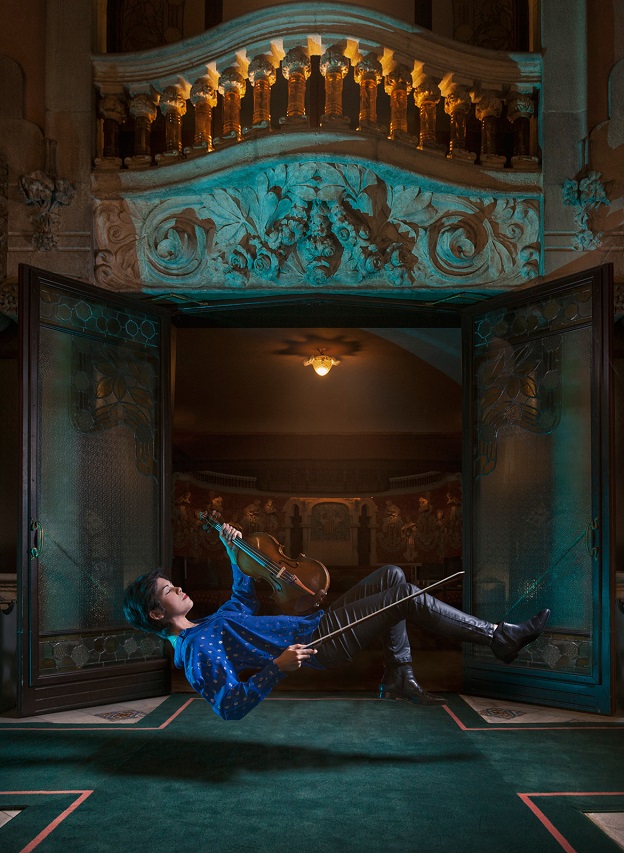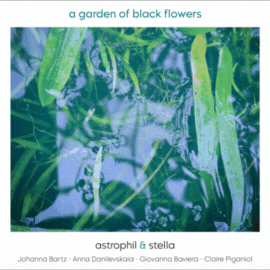In 2017, in an interview for the Spanish magazine JotDown, you said that to get ahead in music, « you have to break out of the margins, you have to break the mould, you have to take risks. Without risk, there is no glory. Even more so being a violist, being Spanish and being a woman. Although it may seem that this issue has become mainstream and normal in society, I feel that this is not the case ». Is ‘Ritual’ a transgression of those margins, those moulds and those conditioning factors?
I always try to follow my own path, and sometimes it is difficult to find a balance between your own nature and passions and what the society expects or with the cultural epoch we are living in. In my opinion, for a XXI century musician, it is now more important than ever to develop one’s own personality as a performer and build one’s own career with a very creative flow. Having said that, I think it is nowadays a very hard thing to achieve.
After more than a decade of professional career, and in this particular moment of my personal life, in my current artistic moment and in the times we are living, I felt it was the right moment to record this ‘Ritual’. I needed to leave a record of this period of my life through music. So I gave form to this ritual through a carefully chosen repertoire and a thorough consideration of the order of the pieces, with the purpose of developing this whole musical experience in a cyclical movement. The concepts of space, sound and silence are extremely important in this project. I would say this is a mystical album.
The program of the album and the concert covers eight centuries of music, from the Middle Ages to the 21st century. Is it a way of saying that all the music is contemporary and that it is the fact of playing it live that makes it contemporary?
Indeed this is a rather philosophical question, because Time has always been the subject of the reflections of many great philosophers, and not only philosophers, but of all of us. This album surpasses the limits of time, and sets its focus on music and vibrations. A listener who ignores when this works were composed could have the impression that they are the result of a very recent concept. Think, for instance, of the beauty and modern lines of the song O Virtus Sapientae by Hildegard von Bingen, or the simple and yet magic Biber’s Passacaglia, or of the resonances in space and the details of Kurtág’s music. However, of course the centre of the album is Bach’s partita No. 2, with the immortal Chaconne. I think music is independent of historic periods, that it is timeless and universal.
 ‘Ritual’ is a program for a solo instrument, but you do not always perform solo, you also play in other settings: with piano, in chamber ensembles, with orchestra… What changes in your way of performing in each context, if anything, and what varies on an intimate, spiritual level, are there any differences?
‘Ritual’ is a program for a solo instrument, but you do not always perform solo, you also play in other settings: with piano, in chamber ensembles, with orchestra… What changes in your way of performing in each context, if anything, and what varies on an intimate, spiritual level, are there any differences?
Every time I perform, I prepare the program obviously thinking on the music and on the format, of course. It is like the work of an actor, we need to immerse ourselves completely in the musical work and perform our role. ‘Ritual’ has something very nude, very intimate and yet very fragile. It is a very demanding program. When I perform in recital with piano, the sound setting changes, as does my approach to the music, and then of course playing as a soloist with orchestra needs even higher energies, you need to be on the top and make music together with this amazing instrument that is an orchestra. Every format has its qualities, very different and specific, but it is our mission and our professional obligation, especially for the younger generations, to adapt to any format. I think this is the magic of being a all-round musician.
Your musical career is also a vindication of viola. Why? Moreover, your initiative ‘Viola Power’ is the expression of this crusade. I also perceive this initiative of yours as a natural consequence of your way of managing your career, your love for independence, your attitude that we could call ‘indie’. Is that so?
Well, I guess this comes from the inner energy of my personality. I have always dreamed about discovering the viola and about making all the audiences discover it, everywhere. There is still a lot for us violists to develop on this very special instrument. The particular characteristics and personality of a given viola are not easy to grasp. Every viola is a different, complex instrument, and I think the violist needs time to acquire a mature relationship with it and to develop a personal voice together with it, getting over all the technical challenges that need to be overcome and discovering the unlimited range of expression that it possesses.
‘Viola Power’ was born from this passion with the aim to connect violists from all over the world. Activities, masterclasses, now the label of my new album… ‘Viola Power’ is a transversal project, still in process, like the viola itself.
 You often insist that classical music must be stripped of the cloak of elitism that covers it, and at the same time, you affirm your interest and love for other types of music, in particular flamenco. How do you see these two endeavours of yours in the more or less immediate and long term future?
You often insist that classical music must be stripped of the cloak of elitism that covers it, and at the same time, you affirm your interest and love for other types of music, in particular flamenco. How do you see these two endeavours of yours in the more or less immediate and long term future?
I cannot help being Spanish, and my roots are very strong in terms of musical inspiration. I started music when I was five, and I played guitar for seven years, in which I did some competitions and concerts, and I was very dedicated to the instrument. It was back then I started to discover flamenco. My father played guitar at home, and flamenco was listened to most of the time. Paco de Lucía has been an incredible inspiration to me, and he still is. Many friends of mine are flamenco artists, and flamenco is a music I cannot stop listening to and I keep discovering it through new artists. I have already performed in some collaborations and projects with different artists, and I am sure that the time will come soon when I will release my own flamenco project! Keep posted!

























